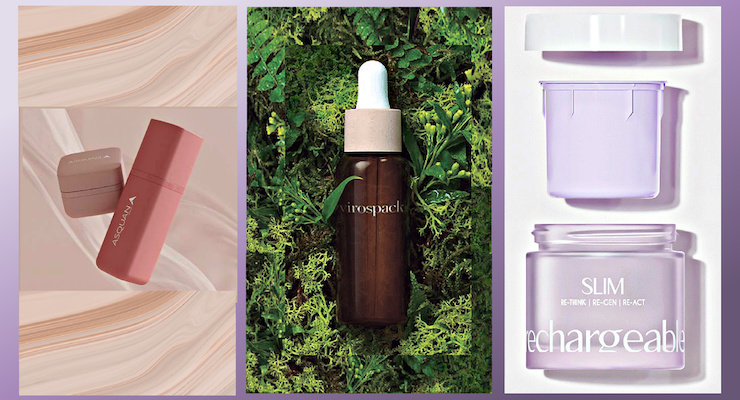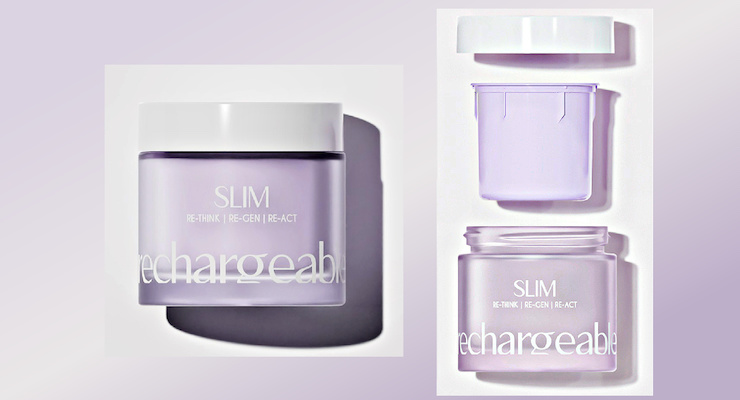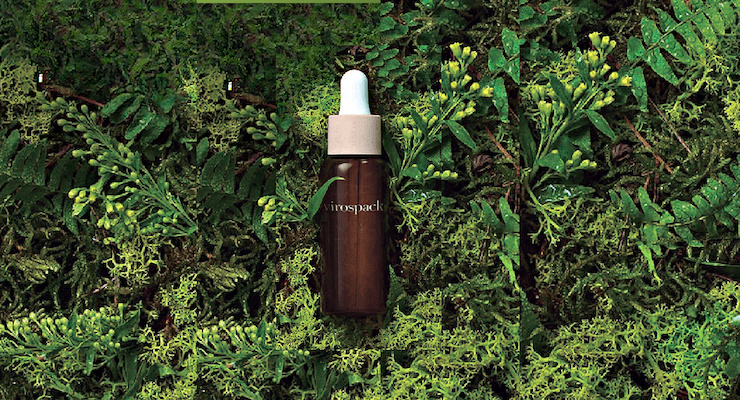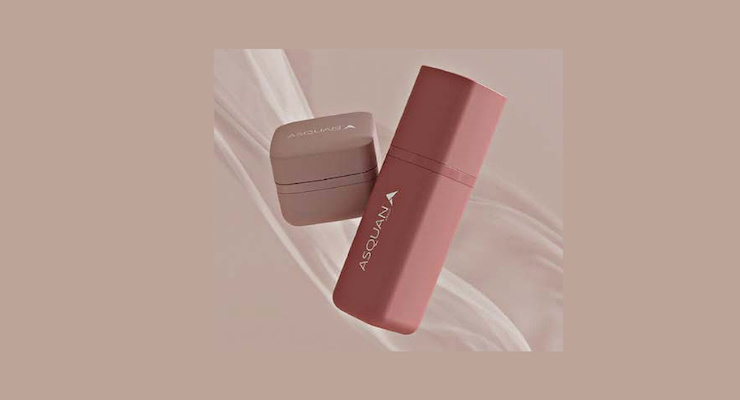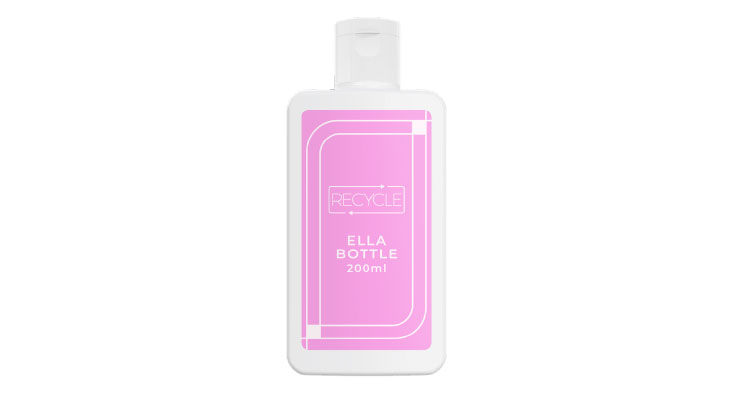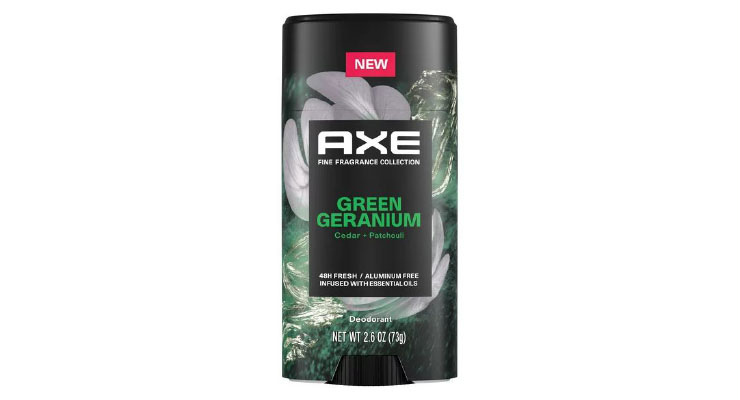Joanna Cosgrove, Contributing Editor04.25.24
Sustainable packaging and practices are now the rule instead of the exception, and beauty packaging suppliers are getting creative with how they’re using recycled and environmentally friendly practices and materials to help brands meet their unique eco-initiatives.
Consumer attitudes have continued to favor products and brands with more eco-conscious practices. “Based on our latest Clean Beauty Survey, we’ve observed a huge shift towards an eco-conscious mindset among beauty consumers,” comments Nikki Stones, Vice President of Marketing, CleanHub, a provider of a suite of services designed to help brands improve their sustainable footprints. “The majority are not just concerned, but they’re actively seeking out brands that prioritize sustainable practices.”
This heightened awareness, Stones says, is translating into tangible consumer demand for transparency and ethical responsibility from beauty brands. “In response, companies that genuinely commit to environmental sustainability are not just meeting this demand but are cultivating deep-rooted loyalty among their consumer base,” she says. “This loyalty is built on shared values, where consumers feel their purchases are contributing to a larger, positive environmental impact.”
Read on for insights into what's new in sustainable and eco-friendly packaging for beauty, from the industry's top suppliers.
Polypropylene often gets a bad rap for its looks, but it’s a winning combination of highly sustainable plastics and delivers performance-wise. The Soft Square Collection’s outer parts are suitable for VM, silk screen, soft touch and spray decoration, and colors can be matched to suit brand needs.
COII Packaging is now producing folding cartons and printed material with Biolithe, a patented natural, low-cost additive for coating, that the company’s Joe Cicci, President Emeritus, says can dramatically reduce the emission of methane gas during carton decomposition in landfills.
Cicci says Biolithe is FDA-approved, carbon-negative, non-toxic and safe. “Biolithe has been certified from extensive studies completed at three major universities specializing in environmental sciences,” Cicci explains, noting that having an understanding of a product’s complete life cycle journey is an important foundation. “Cartons without Biolithe cannot have these claims,” he explains.
Cicci points to one client, Dr. Idriss Skincare Products, who is now incorporating the Biolithe coating to fight global warming and build an earth-friendly brand. Cartons made of Biolithe also bear the Biolithe symbol with the other sustainable symbols, noting the brand’s commitment to the environment.
At MakeUp in Los Angeles in February, Albéa Cosmetics & Fragrance showcased its commitment to sustainability and innovation by highlighting three package configurations with eco-forwardness in their DNA.
Albéa’s Twirl jar features ergonomically designed refills. Ella containers are made from recyclable PP and employ EBM technology from Albéa’s North American facility. The Curl’s Collection for mascaras is made with up to 60% PCR content and is characterized by brushes that marry diverse fibers (including cotton) designed to bring volume and care to lashes.
In addition, the company underscored its commitment to CSR by achieving a 38% reduction in CO2 emissions since 2019, and pledged to design all new products with sustainability at their core, aligning with the Ellen MacArthur Foundation’s New Plastics Economy Global Commitment.
Viva’s latest innovation is a lightweighted, injection-molded D48.5 tube that sets new standards in sustainability and performance. “This cutting-edge tube uses 30% less plastic and weighs 30% less than our standard D48.5 tube, offering a softer squeeze while maintaining the exceptional benefits synonymous with Viva tubes,” says Melanie Gaudun, Business Development Manager, Viva Healthcare Packaging (Canada) Ltd.
The mono-material tube has a PP structure (tube, cap and in-mold label) with the option for up to 87% recycled resin (PCR), as well as an option for foil and EVOH barriers. Gaudun says it additionally boasts the beauty of in-mold label decoration, including outstanding graphics, shoulder-to-crimp coverage, and metallic and special effects, like velvet soft touch.
Viva also expanded its Deodorant family of packaging to include wide sticks produced in its Toronto production facility. The sticks include options for round and oval, top and bottom fill, in-mold label decoration on barrel and cap (a unique way to decorate sticks), and up to 100% recycled polypropylene in barrel, cap and dial parts.
Viva’s work with deodorant sticks is award-winning. The Axe 2.6 oz Deodorant Sticks in Green Geranium won a 2023 AmeriStar award as well as a 2024 World Star award in the Health and Personal Care category.
Gaudun says the sticks were developed to coordinate with a line of four other deodorant stick scents, and a line of Green Geranium Body Sprays and Body Washes. “They take full advantage of high definition, in-mold label decoration to cover the barrel and cap with Axe branding, information, and the image of a white geranium surrounded by a green splash,” she says. “The cap, dial and inner screw are all molded with recycled polypropylene (PCR) in the same North American facility [and] there is no virgin resin in these sticks.”
The artwork is also printed at the same manufacturer. “With the black colorant only in the cap resin, the sticks include over 95% recycled content, in a mono-material design that is fully compatible with the rigid polypropylene recycling stream, as indicated by the how2recycle logo featured in the artwork,” she continues. “They not only stand out on the shelf with their vivid black, green, and white artwork from barrel into cap, but they also stand out as ‘greener,’ more sustainable deodorant stick packaging.”
Packtory is committed to sourcing, testing and offering compostable packaging produced using PHA based bio-resins, zero petrochemical resin content that is TUV, bio-based and BPI certified.
“The next carbon footprint focus for marketers will include bio-resins that are compostable, allowing them to meet their next CO2 reduction goals/targets,” says the company’s Claude Desmarais, Director of Business Development.
Lumson participates in a variety of initiatives that support its environmental commitments. The company maintains a partnership with cutting-edge associations such as Politecnico di Milano and Fondazione Politecnico, which is aligned with Cosmetica Italia, as well as Istituto Italiano Imballaggio and Istituto Italiano dei Plastici for continuous regulatory updates, especially as it relates to the PPWR European Regulation.
The company has added several solutions to its sustainable product portfolio, including refillable glass jars, mono-material accessories and dispensing systems, and post-recycled options.
According to Matteo Carraro, Lumson’s Business Developer, the company’s driving goal is to continually seek new alternative materials for its existing solutions. A recent example of this is evidenced in its approach to the pouch technology in its airless systems. Lumson is now utilizing lightweight and alternative materials like aluminum (TAL) and paper (XPAPER).
“Aluminum and paper are perfect for a lower environmental impact,” Carraro says. “Indeed, if paper was already quite popular as a sustainable material (we have a FSC certification), actually aluminum, less known, is quite easy to recycle too, with the advantage of getting the same properties as the virgin material, at low energy consumption.”
Another of the company’s driving goals is to create solutions that strike a perfect balance between sustainability, ethics and aesthetics. One of Lumson’s latest launches is refillable glass jars. The cover is made up of three components fully in PP, therefore it is eco-friendly but also free of imperfections. Carraro says it’s a practical and purposeful option for those seeking a package that combines ethics and aesthetics.
In addition, Lumson works frequently with RecyClass to fine-tune its plastic recycling guidelines, and maintains a license for Spice, a popular LCA analysis tool in cosmetic packaging, that enables Lumson to make comparisons between different design and material options/decorations, which helps brand partners align with their own sustainability goals.
From Arkay’s greenhouse gas emissions reduction efforts, to its advancements in resource efficiency and waste minimization and responsible material sourcing requirements, Arkay is dedicated to raising the bar as a provider of sustainable packaging.
The company has earned Platinum Certification from EcoVadis for a second consecutive year, representative of its place in the top 1% of companies worldwide for environmental and social responsibility. Additionally, Arkay achieved a top tier AA+ safety and quality rating from the BRC Global Standard.
Environmental stewardship is a key component of Arkay’s comprehensive sustainability program. “Our Forest Stewardship Council (FSC) and Sustainable Forestry Initiative (SFI) Certifications affirm our commitment to sourcing materials from sustainably managed forests,” says Ruth Rugoff, the company’s Chief Communications Officer. “In addition, Arkay proudly holds CarbonNeutral status achieved through robust greenhouse gas reduction efforts across our value chain and offsetting remaining emissions via the purchase of carbon offsets and Renewable Energy Credits in accordance with the CarbonNeutral Protocol.”
In addition to being a top-performing subscriber with the EcoVadis sustainability ratings platform, Viva announced its inaugural ESG commitment last year, marking a significant milestone in its journey toward sustainability. “Our commitment centers on the production of innovative and sustainable packaging solutions that contribute positively to the environment, while minimizing our ecological footprint,” comments Viva’s Gaudun, who adds that the key elements of the commitment include implementing progressive annual reductions in total GHG Emissions Intensity for Scope 1 + 2, and increasing the percentage of PCR versus virgin resin in its products.
“As beauty brands increasingly prioritize environmental, social and governance (ESG) initiatives, partnering with Viva offers them a tangible opportunity to enhance their ESG profiles and reduce their ecological footprint,” explains Gaudun. “By choosing packaging solutions from Viva, brands can align themselves with a trusted partner committed to sustainability and contribute to a more environmentally responsible future.”
Virospack’s commitment to sustainability is reflected in its choice of eco-friendly recycled glass and recyclable plastic materials to minimize the environmental footprint of its packaging solutions.
In 2023, Virospack debuted a plant-based dropper cap made of Forewood in partnership with the German company Rezemo. Forewood is PEFC certified sustainable, and is composed of a biodegradable biopolymer, 100% compostable plant-based and zero fossil resources, which reduces its CO2 footprint. It replaces conventional plastic but provides the same functionality and performance while having a natural look that’s customizable via Virospack’s in-house custom decoration and finishes for the cap and bulb parts.
“Replacing fossil resources with renewable raw materials—that is the idea behind 100% bio-based polymers,” comments Verena Regina Fiori Ferreira, Virospack’s Marketing Director. “The combination of wood fibers and biopolymers enables the production of unique materials that are 100% bio-based and contain no substances of fossil origin. Forewood materials convey their sustainability through their natural appearance and allow their properties to be flexibly adapted to different cosmetics packaging requirements.”
Beyond its commitment to producing inherently sustainable products, Virospack also offers processes like metallization that are carried out with low VOC (Volatile Organic Compound) emissions.
What’s more, the company’s incinerator allows it to burn any remaining VOCs in the paints. It also routinely invests in research and development to minimize solvent use in its products and paints, reducing emissions wherever possible. Virospack also holds ISO, EMAS and GOLD certifications from EcoVadis.
Finally, the company has invested 30 million euros in a new plant that’s BREEAM certified and equipped with geothermal (50 kW thermal), photovoltaic solar panels (400 kW) and an automated warehouse spanning 19,300 m2. Ferreira says the plant will increase Virospack’s production capacity by up to 65% to reach 100 million units by 2026.
CleanHub also works with brands to first understand and minimize their environmental footprints and reduce excess packaging. Then, they team to invest in the removal of plastic from highly polluted coastal regions—an effort that not only contributes to reducing plastic pollution but also demonstrates a sustainable commitment to brands’ customers. “Together with our brand partners, we’re proud to have collected over 8 million kg of plastic waste,” says Nikki Stones, CleanHub’s Vice President of Marketing. “These efforts combined are essential for advancing a circular economy and meeting the growing consumer demand for responsible business practices.”
Brands can choose to collect plastic for every product sold or to collect the equivalent of their plastic footprint, giving customers the promise of genuine impact with every purchase, Stones adds.
CleanHub also provides brands with the communication tools necessary for sharing their impact story and building customer trust while minimizing greenwashing with an emphasis on transparency.
“We’ve built technology that tracks the full process from the collection to the disposal of plastic waste, bringing full transparency,” she says, noting that there’s also real-time digital evidence of brand impact that CleanHub calls its “anti-greenwash guarantee.”
CleanHub has recently been reverified by TÜV SÜD, “a globally respected testing, certification and inspection organization,” according to ISO standards. “TÜV SÜD’s endorsement means that every claim we make about plastic waste management is backed by solid evidence,” says Stones.
The Market Outlook for Reusable & Refillable Packaging
Consumer attitudes have continued to favor products and brands with more eco-conscious practices. “Based on our latest Clean Beauty Survey, we’ve observed a huge shift towards an eco-conscious mindset among beauty consumers,” comments Nikki Stones, Vice President of Marketing, CleanHub, a provider of a suite of services designed to help brands improve their sustainable footprints. “The majority are not just concerned, but they’re actively seeking out brands that prioritize sustainable practices.”
This heightened awareness, Stones says, is translating into tangible consumer demand for transparency and ethical responsibility from beauty brands. “In response, companies that genuinely commit to environmental sustainability are not just meeting this demand but are cultivating deep-rooted loyalty among their consumer base,” she says. “This loyalty is built on shared values, where consumers feel their purchases are contributing to a larger, positive environmental impact.”
Read on for insights into what's new in sustainable and eco-friendly packaging for beauty, from the industry's top suppliers.
New Eco-Friendly Packaging Options
On the new packaging front, Asquan Group’s in-house design and engineering teams have developed a packaging family that is aesthetically pleasing while also checking off several sustainable features. “We designed the Soft Square Collection to have softly arcing sides and heavily radiused corners; this not only minimized the footprint of a traditional square but also gave a superior feel when held and interacted with,” says Michelle Wong, Executive Director of Design & Innovation.Polypropylene often gets a bad rap for its looks, but it’s a winning combination of highly sustainable plastics and delivers performance-wise. The Soft Square Collection’s outer parts are suitable for VM, silk screen, soft touch and spray decoration, and colors can be matched to suit brand needs.
COII Packaging is now producing folding cartons and printed material with Biolithe, a patented natural, low-cost additive for coating, that the company’s Joe Cicci, President Emeritus, says can dramatically reduce the emission of methane gas during carton decomposition in landfills.
Cicci says Biolithe is FDA-approved, carbon-negative, non-toxic and safe. “Biolithe has been certified from extensive studies completed at three major universities specializing in environmental sciences,” Cicci explains, noting that having an understanding of a product’s complete life cycle journey is an important foundation. “Cartons without Biolithe cannot have these claims,” he explains.
Cicci points to one client, Dr. Idriss Skincare Products, who is now incorporating the Biolithe coating to fight global warming and build an earth-friendly brand. Cartons made of Biolithe also bear the Biolithe symbol with the other sustainable symbols, noting the brand’s commitment to the environment.
At MakeUp in Los Angeles in February, Albéa Cosmetics & Fragrance showcased its commitment to sustainability and innovation by highlighting three package configurations with eco-forwardness in their DNA.
Albéa’s Twirl jar features ergonomically designed refills. Ella containers are made from recyclable PP and employ EBM technology from Albéa’s North American facility. The Curl’s Collection for mascaras is made with up to 60% PCR content and is characterized by brushes that marry diverse fibers (including cotton) designed to bring volume and care to lashes.
In addition, the company underscored its commitment to CSR by achieving a 38% reduction in CO2 emissions since 2019, and pledged to design all new products with sustainability at their core, aligning with the Ellen MacArthur Foundation’s New Plastics Economy Global Commitment.
Viva’s latest innovation is a lightweighted, injection-molded D48.5 tube that sets new standards in sustainability and performance. “This cutting-edge tube uses 30% less plastic and weighs 30% less than our standard D48.5 tube, offering a softer squeeze while maintaining the exceptional benefits synonymous with Viva tubes,” says Melanie Gaudun, Business Development Manager, Viva Healthcare Packaging (Canada) Ltd.
The mono-material tube has a PP structure (tube, cap and in-mold label) with the option for up to 87% recycled resin (PCR), as well as an option for foil and EVOH barriers. Gaudun says it additionally boasts the beauty of in-mold label decoration, including outstanding graphics, shoulder-to-crimp coverage, and metallic and special effects, like velvet soft touch.
Viva also expanded its Deodorant family of packaging to include wide sticks produced in its Toronto production facility. The sticks include options for round and oval, top and bottom fill, in-mold label decoration on barrel and cap (a unique way to decorate sticks), and up to 100% recycled polypropylene in barrel, cap and dial parts.
Viva’s work with deodorant sticks is award-winning. The Axe 2.6 oz Deodorant Sticks in Green Geranium won a 2023 AmeriStar award as well as a 2024 World Star award in the Health and Personal Care category.
Gaudun says the sticks were developed to coordinate with a line of four other deodorant stick scents, and a line of Green Geranium Body Sprays and Body Washes. “They take full advantage of high definition, in-mold label decoration to cover the barrel and cap with Axe branding, information, and the image of a white geranium surrounded by a green splash,” she says. “The cap, dial and inner screw are all molded with recycled polypropylene (PCR) in the same North American facility [and] there is no virgin resin in these sticks.”
The artwork is also printed at the same manufacturer. “With the black colorant only in the cap resin, the sticks include over 95% recycled content, in a mono-material design that is fully compatible with the rigid polypropylene recycling stream, as indicated by the how2recycle logo featured in the artwork,” she continues. “They not only stand out on the shelf with their vivid black, green, and white artwork from barrel into cap, but they also stand out as ‘greener,’ more sustainable deodorant stick packaging.”
Packtory is committed to sourcing, testing and offering compostable packaging produced using PHA based bio-resins, zero petrochemical resin content that is TUV, bio-based and BPI certified.
“The next carbon footprint focus for marketers will include bio-resins that are compostable, allowing them to meet their next CO2 reduction goals/targets,” says the company’s Claude Desmarais, Director of Business Development.
The Importance of Certifications
Responsible products and practices carry more weight when they are recognized and validated by an accredited and respected third party.Lumson participates in a variety of initiatives that support its environmental commitments. The company maintains a partnership with cutting-edge associations such as Politecnico di Milano and Fondazione Politecnico, which is aligned with Cosmetica Italia, as well as Istituto Italiano Imballaggio and Istituto Italiano dei Plastici for continuous regulatory updates, especially as it relates to the PPWR European Regulation.
The company has added several solutions to its sustainable product portfolio, including refillable glass jars, mono-material accessories and dispensing systems, and post-recycled options.
According to Matteo Carraro, Lumson’s Business Developer, the company’s driving goal is to continually seek new alternative materials for its existing solutions. A recent example of this is evidenced in its approach to the pouch technology in its airless systems. Lumson is now utilizing lightweight and alternative materials like aluminum (TAL) and paper (XPAPER).
“Aluminum and paper are perfect for a lower environmental impact,” Carraro says. “Indeed, if paper was already quite popular as a sustainable material (we have a FSC certification), actually aluminum, less known, is quite easy to recycle too, with the advantage of getting the same properties as the virgin material, at low energy consumption.”
Another of the company’s driving goals is to create solutions that strike a perfect balance between sustainability, ethics and aesthetics. One of Lumson’s latest launches is refillable glass jars. The cover is made up of three components fully in PP, therefore it is eco-friendly but also free of imperfections. Carraro says it’s a practical and purposeful option for those seeking a package that combines ethics and aesthetics.
In addition, Lumson works frequently with RecyClass to fine-tune its plastic recycling guidelines, and maintains a license for Spice, a popular LCA analysis tool in cosmetic packaging, that enables Lumson to make comparisons between different design and material options/decorations, which helps brand partners align with their own sustainability goals.
From Arkay’s greenhouse gas emissions reduction efforts, to its advancements in resource efficiency and waste minimization and responsible material sourcing requirements, Arkay is dedicated to raising the bar as a provider of sustainable packaging.
The company has earned Platinum Certification from EcoVadis for a second consecutive year, representative of its place in the top 1% of companies worldwide for environmental and social responsibility. Additionally, Arkay achieved a top tier AA+ safety and quality rating from the BRC Global Standard.
Environmental stewardship is a key component of Arkay’s comprehensive sustainability program. “Our Forest Stewardship Council (FSC) and Sustainable Forestry Initiative (SFI) Certifications affirm our commitment to sourcing materials from sustainably managed forests,” says Ruth Rugoff, the company’s Chief Communications Officer. “In addition, Arkay proudly holds CarbonNeutral status achieved through robust greenhouse gas reduction efforts across our value chain and offsetting remaining emissions via the purchase of carbon offsets and Renewable Energy Credits in accordance with the CarbonNeutral Protocol.”
In addition to being a top-performing subscriber with the EcoVadis sustainability ratings platform, Viva announced its inaugural ESG commitment last year, marking a significant milestone in its journey toward sustainability. “Our commitment centers on the production of innovative and sustainable packaging solutions that contribute positively to the environment, while minimizing our ecological footprint,” comments Viva’s Gaudun, who adds that the key elements of the commitment include implementing progressive annual reductions in total GHG Emissions Intensity for Scope 1 + 2, and increasing the percentage of PCR versus virgin resin in its products.
“As beauty brands increasingly prioritize environmental, social and governance (ESG) initiatives, partnering with Viva offers them a tangible opportunity to enhance their ESG profiles and reduce their ecological footprint,” explains Gaudun. “By choosing packaging solutions from Viva, brands can align themselves with a trusted partner committed to sustainability and contribute to a more environmentally responsible future.”
Virospack’s commitment to sustainability is reflected in its choice of eco-friendly recycled glass and recyclable plastic materials to minimize the environmental footprint of its packaging solutions.
In 2023, Virospack debuted a plant-based dropper cap made of Forewood in partnership with the German company Rezemo. Forewood is PEFC certified sustainable, and is composed of a biodegradable biopolymer, 100% compostable plant-based and zero fossil resources, which reduces its CO2 footprint. It replaces conventional plastic but provides the same functionality and performance while having a natural look that’s customizable via Virospack’s in-house custom decoration and finishes for the cap and bulb parts.
“Replacing fossil resources with renewable raw materials—that is the idea behind 100% bio-based polymers,” comments Verena Regina Fiori Ferreira, Virospack’s Marketing Director. “The combination of wood fibers and biopolymers enables the production of unique materials that are 100% bio-based and contain no substances of fossil origin. Forewood materials convey their sustainability through their natural appearance and allow their properties to be flexibly adapted to different cosmetics packaging requirements.”
Beyond its commitment to producing inherently sustainable products, Virospack also offers processes like metallization that are carried out with low VOC (Volatile Organic Compound) emissions.
What’s more, the company’s incinerator allows it to burn any remaining VOCs in the paints. It also routinely invests in research and development to minimize solvent use in its products and paints, reducing emissions wherever possible. Virospack also holds ISO, EMAS and GOLD certifications from EcoVadis.
Finally, the company has invested 30 million euros in a new plant that’s BREEAM certified and equipped with geothermal (50 kW thermal), photovoltaic solar panels (400 kW) and an automated warehouse spanning 19,300 m2. Ferreira says the plant will increase Virospack’s production capacity by up to 65% to reach 100 million units by 2026.
Stopping Waste in its Tracks
With waste being one of the biggest issues facing the beauty industry, CleanHub is partnering with brands to stop waste in its tracks.CleanHub also works with brands to first understand and minimize their environmental footprints and reduce excess packaging. Then, they team to invest in the removal of plastic from highly polluted coastal regions—an effort that not only contributes to reducing plastic pollution but also demonstrates a sustainable commitment to brands’ customers. “Together with our brand partners, we’re proud to have collected over 8 million kg of plastic waste,” says Nikki Stones, CleanHub’s Vice President of Marketing. “These efforts combined are essential for advancing a circular economy and meeting the growing consumer demand for responsible business practices.”
Brands can choose to collect plastic for every product sold or to collect the equivalent of their plastic footprint, giving customers the promise of genuine impact with every purchase, Stones adds.
CleanHub also provides brands with the communication tools necessary for sharing their impact story and building customer trust while minimizing greenwashing with an emphasis on transparency.
“We’ve built technology that tracks the full process from the collection to the disposal of plastic waste, bringing full transparency,” she says, noting that there’s also real-time digital evidence of brand impact that CleanHub calls its “anti-greenwash guarantee.”
CleanHub has recently been reverified by TÜV SÜD, “a globally respected testing, certification and inspection organization,” according to ISO standards. “TÜV SÜD’s endorsement means that every claim we make about plastic waste management is backed by solid evidence,” says Stones.
Related News
New Frontiers in Sustainable PackagingThe Market Outlook for Reusable & Refillable Packaging

